That's if Japan can keep its birth rate above replacement levels. I do see Japan being really well off for the next several decades post war, but they're still going to face similar issues as otl Japan imo.Sorry this just doesn't just not make sense, it's straight up wrong
Japan treated the 80,000 Russian POWs well in the 1905 Russo-Japanese war and was commended by the International Red Cross for its treatment of Russian POWs. This was apparently driven by Japan's desire to be seen as a nation equal to western powers. In the previous 1894 Sino-Japanese war, Chinese prisoners and civilians had been treated rather badly and massacred at Port Arthur. A fact which the Japanese Army and government obscured for it's own internal reasons as well as negative international opinion. 5,000 German troops captured in 1914 also received good treatment and had a low death rate (approx 1%) for three years of captivity.
Japan's treatment of it's own captured soldiers and sailors for those three conflicts is a more complex story. The ideals of the Japanese military emphasized death before dishonor in all of it's wars, but their policy was often flexible. In Japan's civil wars prisoners were either executed or pardoned depending on political expediency. In the Sino-Japanese war, propaganda was produced demonizing the Chinese for cruelty and warning troops against surrender, but almost no troops (only 11, 10 porters and a soldier with a head wound) actually found themselves in a situation where it would have been required to surrender.
In the Russo-Japanese war about 2,000 Japanese troop were captured during the war and repatriated at the end of it. These cases were all investigated by postwar military councils to make sure they did their full duty before being captured. Soldiers could expect to have to apologize and endure insults, but were seldom harshly punished, and only a few officers were forced to resign or cashiered. However, informal administrative punishment could be very unpleasant, and out of the service some former prisoners were ostracized by their communities and forced to move elsewhere. Stories circulated regarding the disgraceful fates of dishonored soldiers and their families and these set the stage for the later official and unofficial prohibitions against surrender in the WWII era.
Source: Drea, Edward J. Japan's Imperial Army: Its Rise and Fall 1853-1945
If Japan has control over Manchuria, than Chinese Central Authority does not exist. And besides, Japan has the power to disintegrate the whole damned country. In OTL they managed to make successful offensives against China as late as 1944, in TTL Japan would just obliterate China in a war.
Honestly I see Imperial Japan having a good chance to win the Cold War, I already said why Germany would become irrelevant by the 70s and now i'll talk about why America will collapse.
Personally, I think they could keep ahold of Canada easily enough because well...All you have to do is swamp the place in Settlers and you outnumber the people there. Not to say that the Candian Population would be irrelevant but managing to dislodge the Americans? Nah. As for Utah, they answered that in probably one of the Cringiest scenes of the books. Flora Hamburger got to pushing a plan of whats basically Ethnic Cleansing and deporting all the Mormons to Hawii (And this is depicted as a Good Idea, which also because it comes from Flora "concieus of the House" Hamburger makes it pure cringe). But on the Confedracy? Yeah, I dont see it happening. The South has had too long to develop a indepdent identity and unlike Canada, you cant just drown them in Numbers. You could maybe make it work if you took a more soft handed policy to Military occupation and focused on making peoples lives as comfortable as possible and educating the next generation as 100 percent Americans but well... stuff like killing 1500 people for the death of 32 sailors is not making any freinds. Thus it counts on the political will of the American people to maintain the Occupation and after the first Remeberance Generation thats going fade fast.
We see US has Philly superbombed by Potter. Newport News was superbombed by the Americans. The former CSA is an economic ruin after a devastating war and a genocide, Canada had a three year rebellion that hindered the US war effort, the Mormons rose up (again). At least half a dozen or so states experienced active fighting and widespread destruction. I expect the US to be very sort of draconian especially given how they treated people in Florida post-war.
I don't see Canada getting self-determination. The Democrats are the Party of Remembrance and won't give up power to the Canadians, the Socialists are tarred by the Richmond Agreement and will be unwilling to risk another blow-up in their face, and the Republicans have been out of power since 1884 and are the point-five in the 2.5 party system the US has. With the Democrats unwilling to compromise, the Socialists tarred by their last attempt at compromise, and the Republicans unable to do anything, the situation will just inevitably become untenable while the US gets in a Cold War-esque scenario with the Germans and the Japanese.
The US is, as far as I see it, a Prussian-style USSR which will inevitably collapse under its own weight while it was suppressing the Mormons, the Canadians, and the former Confederates.
The ratio I've generally seen is 1 soldier for every 50 civilians for effective counter-insurgency. And while have no idea what the population of all the US occupied territories will be by 1990, if we go by OTL's 1990 population numbers that will give us some idea of how big a military the US might have to maintain just to hold onto those territories.
The Southern states (including Kentucky and Oklahoma but not including Texas) have an estimated 60,611,407 people, so that would require 1,212,228 soldiers.
Canada (not including Quebec) has an estimated 20,793,014 people, so that would require 415,860 soldiers.
Utah has an estimated 1,722,850 people, so that would require 34,457 soldiers.
Cuba has an estimated 10.6 million people, so that would require 212,000 soldiers.
The 2 Baja provinces, Sonora and Chihuahua have an estimated 6,244,098 people, so that would require 124,881 soldiers.
And Hawaii has an estimated 985,000 people, so that would require 19,700 soldiers.
So if all those places still require military occupation then the US would need an army of 2,019,126 soldiers just for occupation duty. And realistically the U.S. Armed Forces will probably have to be at least twice that size so that the U.S. can have a decent navy and air force and some reserve capability. As such we're probably looking at a military of at least 4 million people. The U.S. probably can just barely afford that but it will mean accepting considerably higher taxes and a greatly reduced welfare state from OTL.
There's a non-zero chance that we see both Germany and America collapsing and a Imperial Japan ascending as the world's hyperpower, drawing all nations under the sun under the co-prosperity sphere and the twenty first century being the Japanese Century.
Which might make for an interesting grimdark timeline as Japan brings the Co-Prosperity system to Europe and North America and gradually crushes all hope for the future through crushing mandatory economic specialisation and stripping the former Imperial core of the world for wealth like Britain did with India and China in the 19th century until Europe and North America are driven to poverty to elevate Japan's prosperity to unmatched heights.
You are using an out of date browser. It may not display this or other websites correctly.
You should upgrade or use an alternative browser.
You should upgrade or use an alternative browser.
TL-191: Postwar
- Thread starter kernel
- Start date
-
- Tags
- continuation tl-191
bguy
Donor
Sorry this just doesn't just not make sense, it's straight up wrong
The POD for TL-191 is 40 years before Japan's invasion of the Philippines, and we know almost nothing about what happened to it in those forty years. You may not like that Turtledove had Japan acting in a brutal fashion as early as 1900, you may think it's unrealistic and reflects poor historical research on the part of the author (and I would actually agree with you on all three of those points), but the fat remains that is what is established in the TL-191 canon. And a Japan that brutalizes prisoners of war, is probably not a Japan that is winning hearts and minds of its subject people.
If Japan has control over Manchuria, than Chinese Central Authority does not exist.
Not sure I follow your logic here. Japan controlled Manchuria IOTL, and there was still a Chinese government opposed to them.
And besides, Japan has the power to disintegrate the whole damned country. In OTL they managed to make successful offensives against China as late as 1944, in TTL Japan would just obliterate China in a war.
Successful offensives do not in and of themselves guarantee you will win the war. IOTL the US had plenty of successful offensives in both Vietnam and Afghanistan and still lost both wars.
Honestly I see Imperial Japan having a good chance to win the Cold War, I already said why Germany would become irrelevant by the 70s and now i'll talk about why America will collapse.
Personally, I think they could keep ahold of Canada easily enough because well...All you have to do is swamp the place in Settlers and you outnumber the people there. Not to say that the Candian Population would be irrelevant but managing to dislodge the Americans? Nah. As for Utah, they answered that in probably one of the Cringiest scenes of the books. Flora Hamburger got to pushing a plan of whats basically Ethnic Cleansing and deporting all the Mormons to Hawii (And this is depicted as a Good Idea, which also because it comes from Flora "concieus of the House" Hamburger makes it pure cringe). But on the Confedracy? Yeah, I dont see it happening. The South has had too long to develop a indepdent identity and unlike Canada, you cant just drown them in Numbers. You could maybe make it work if you took a more soft handed policy to Military occupation and focused on making peoples lives as comfortable as possible and educating the next generation as 100 percent Americans but well... stuff like killing 1500 people for the death of 32 sailors is not making any freinds. Thus it counts on the political will of the American people to maintain the Occupation and after the first Remeberance Generation thats going fade fast.
Maybe, but why would that cause the US to collapse? The TL-191 US doesn't actually need anything from the former Confederate States. If it loses the will to occupy that region, it can easily pull its troops out and still maintain effective control over the region through a combination of economic power and gunboat diplomacy. (Similar to how the US IOTL exerted dominance over Latin America for most of the 20th century.)
The US is, as far as I see it, a Prussian-style USSR which will inevitably collapse under its own weight while it was suppressing the Mormons, the Canadians, and the former Confederates.
And how is Japan any better off when it is having to hold down an even larger population? Lets look at the population of its various holdings circa 1990 IOTL.
Philippines. (61.56 million.)
Indonesia (182.2 million)
Korea (63.67 million)
Indochina (80.13 million)
Taiwan (20.58 million)
That's a total of 408.14 million people. Using your ratio of 1 soldier to 50 citizens that would require an army of occupation of 8.16 million soldiers.
And you're actually wanting to add China to that (1.13 billion population IOTL in 1990.) That would require another 22.6 million soldiers for a total of over 30 million soldiers. (i.e. 1/4 of the entire Japanese population.)
(Even if the Japanese settle for just trying to occupy Manchura, since Manchuria is about 8% of the Chinese population, Japan would still need 1.8 million soldiers there for a total occupation army of 9.24 million.)
And that's just the Japanese need for occupation forces. Unlike the TL-191 US, Japan also shares a land border with a hostile major power (Russia) that can potentially field an army of millions against them, so Japan will also need to maintain a huge army on their border with Russia. And this while also maintaining a navy and air force that can match the United States in any conflict in the Pacific, and maintaining a credible nuclear deterrent.
The ratio I've generally seen is 1 soldier for every 50 civilians for effective counter-insurgency. And while have no idea what the population of all the US occupied territories will be by 1990, if we go by OTL's 1990 population numbers that will give us some idea of how big a military the US might have to maintain just to hold onto those territories.
The Southern states (including Kentucky and Oklahoma but not including Texas) have an estimated 60,611,407 people, so that would require 1,212,228 soldiers.
Canada (not including Quebec) has an estimated 20,793,014 people, so that would require 415,860 soldiers.
Utah has an estimated 1,722,850 people, so that would require 34,457 soldiers.
Cuba has an estimated 10.6 million people, so that would require 212,000 soldiers.
The 2 Baja provinces, Sonora and Chihuahua have an estimated 6,244,098 people, so that would require 124,881 soldiers.
And Hawaii has an estimated 985,000 people, so that would require 19,700 soldiers.
So if all those places still require military occupation then the US would need an army of 2,019,126 soldiers just for occupation duty. And realistically the U.S. Armed Forces will probably have to be at least twice that size so that the U.S. can have a decent navy and air force and some reserve capability. As such we're probably looking at a military of at least 4 million people. The U.S. probably can just barely afford that but it will mean accepting considerably higher taxes and a greatly reduced welfare state from OTL.
Those estimates are a little high. Remember a lot of the OTL population of the southern states is made up of African-Americans (who will not be opposing the US occupation in TL-191.) It's generally held that African-Americans made up about 1/3 of the population of the CSA, so the Confederate population the US would actually have to hold down is really more like 40 million people. (Still a lot but that reduces the US army of occupation in the south from 1.2 million down to 800,000.)
And that means the total population the US is having to hold down by force of arms, comes out to somewhere around 80 million people. That's 1/5 the population that Japan is having to hold down. (And that's assuming Japan isn't trying to occupy any part of China. Manchuria alone has more people than the entire hostile population the US is trying to hold down.) Thus the US (with a larger economy than Japan), has a much smaller hostile population it has to hold down. (And unlike Japan, it doesn't have to worry about attack from a conventional army since it doesn't share a land border with another great power.)
As for the cost of maintaining such an army, IOTL the US military had about 3.5 million service members in 1968.
https://historyinpieces.com/research/us-military-personnel-1954-2014
Thus when we deduct the 400,000 troops the US won't need because it doesn't have to hold down the African-American population in the south from your projection, that leaves us with 3.6 million service members, a force that is just slightly larger than what the US had at the height of the OTL Cold War. We know the US can afford a force of that size without ruinous taxes or gutting the welfare state because it did so IOTL.
The B-36 is still a pipe dream as this USA hasn't even developed the B-29 and lack almost all OTL USA experience in long range bombing...plus all the forward base that you mentioned belong to nations that are not allied with the USA and the landing base well much depend on the good will of Germany and the Ottoman Empire, that's hardly a given.Incorrect. IOTL most of SAC's assets during the Cold War were stationed in North America. They were going to hit the Soviets by flying north from North America and coming in across the Arctic Circle not by coming in from Europe. (You want your long range bombers based as far away from enemy territory as possible to reduce the likelihood of them getting caught on the ground in a surprise attack.)
Relevant quote from the B-36 wikipedia page
"War missions would have been one-way, taking off from forward bases in Alaska or Greenland, overflying the USSR, and landing in Europe, Morocco, or the Middle East. "

Convair B-36 Peacemaker - Wikipedia
en.wikipedia.org
Regarding any attack towards Japan, well at least there is the need to make agreement with Australia, probable due to having the japanese breathing on their neck, but it will took time and again money to build the necessary infrastructure...if not start a crisis between the two nation
kernel
Gone Fishin'
I would prefer year by year for the USA but scrapbook of other countries and events outside North America.
I'll probably keep the year by year format then ... but have scrapbook entries in between years to further flesh out the world of TL-191.I go for year to year format
Yeah, no i'm going to disregard and ignore that part and write it off as ignorance on Turtledoves part; which if a new edition of this book series is ever republished that part would almost certainly be edited out and retconned by any editor going through this with any knowledge of Japanese history.The POD for TL-191 is 40 years before Japan's invasion of the Philippines, and we know almost nothing about what happened to it in those forty years. You may not like that Turtledove had Japan acting in a brutal fashion as early as 1900, you may think it's unrealistic and reflects poor historical research on the part of the author (and I would actually agree with you on all three of those points), but the fat remains that is what is established in the TL-191 canon. And a Japan that brutalizes prisoners of war, is probably not a Japan that is winning hearts and minds of its subject people.
And that's just the Japanese need for occupation forces. Unlike the TL-191 US, Japan also shares a land border with a hostile major power (Russia) that can potentially field an army of millions against them, so Japan will also need to maintain a huge army on their border with Russia. And this while also maintaining a navy and air force that can match the United States in any conflict in the Pacific, and maintaining a credible nuclear deterrent.
It's implied at the end of the series that Russia is beginning to implode (to the extent that central authority possibly collapsed) and the Japanese are kicking their asses. It's not even a guarantee that there's going to be a Russia left standing at the end of the decade.
Last edited:
Togliatti
kernel
Gone Fishin'
“ … one of the few Italian socialists to favor joining the Entente during the First Great War. Incensed by the fact that fellow Italians in Tyrol and Dalmatia remained under the control of the reactionary Austrian State, Palmiro Togliatti would try, with little avail, to persuade his party to support intervention.
Following the Bolshevik revolt and Russian Civil War of the 1920s, Togliatti briefly left the PSI (Italian Socialist Party) and, along with Antonio Gramsci, founded the Communist Party of Italy. Yet, once the true facts of the Red Terror became known, and the Bolshevik movement was inevitably defeated, Togliatti became disillusioned with radical socialism and Leninism, returning to his old home in the PSI. By this time the political situation in Italy had changed drastically. The PSI was beginning to lose its stature as the largest political party. New nationalist movements, such as the National Fascist Party, threatened to permanently end Italy’s liberal democracy before fizzling out just as fast as they had risen. [...]
After more than a decade under the conservative rule of the Italian People’s Party (PPI), Togliatti led the PSI to regain the reins of power in 1939, rising on a tide of discontent due to the ongoing depression and the failed Spanish intevention [1]. Two years after his election as Prime Minister of Italy, Europe plunged into war. Togliatti was less inclined to throw his lot with the Central or Radial Powers, equally dreading both a German-dominated and an Actionist dominated Europe. As superbombs rained down on the capitals of the Radial Powers, Togliatti initiated Operation Tiberius, capturing key territories from Britain and France in the hopes that Italy would be well positioned to serve as a counterbalance to the Central Powers […]
The death of Mussolini proved to be one of the greatest crises of the Tolgiatti government. As Italy and Austria-Hungary entered a diplomatic crisis, and Italian nationalism became inflamed on both sides of the border, it seemed to many that the 1920s were returning, and that political extremism was rearing its head once more. On the streets of Italian cities, both right-wingers and socialists carried signs calling for a Greater Italy, and major newspapers across the political spectrum printed cartoons showing Austria-Hungary being broken apart into various ethnic nations. The greatest point in the crisis came when imprisoned trade unionist and agitator Josip Tito escaped from his cell in Ljubjljana, and upon making his way to Italy was granted asylum ....”
- Togliatti, Phillip Downing (1997)
“The upcoming meeting of the International Working Union of Socalist Parties represents a critical juncture for the working classes across the world. After several terrible years of war, we now must grasp the opportunity to achieve liberation for all the toiling masses. In the continent of Europe, with its aristocratic excesses and reactionary oppression, Comrade Togliatti’s Italy remains a beacon of hope. It is therefore no coincidence that all representatives will gather in Rome to decide on the direction of the international socialist movement, and it would be my honor to lead the delegation for the Socialist Party of America.”
- Henry Wallace’s speech to the Socialist Party of America’s 1945 National Convention (held on December 11th, 1945)
[1] In my headcanon, Italy sent troops to assist the Spanish Monarchy during the Spanish Civil War
Following the Bolshevik revolt and Russian Civil War of the 1920s, Togliatti briefly left the PSI (Italian Socialist Party) and, along with Antonio Gramsci, founded the Communist Party of Italy. Yet, once the true facts of the Red Terror became known, and the Bolshevik movement was inevitably defeated, Togliatti became disillusioned with radical socialism and Leninism, returning to his old home in the PSI. By this time the political situation in Italy had changed drastically. The PSI was beginning to lose its stature as the largest political party. New nationalist movements, such as the National Fascist Party, threatened to permanently end Italy’s liberal democracy before fizzling out just as fast as they had risen. [...]
After more than a decade under the conservative rule of the Italian People’s Party (PPI), Togliatti led the PSI to regain the reins of power in 1939, rising on a tide of discontent due to the ongoing depression and the failed Spanish intevention [1]. Two years after his election as Prime Minister of Italy, Europe plunged into war. Togliatti was less inclined to throw his lot with the Central or Radial Powers, equally dreading both a German-dominated and an Actionist dominated Europe. As superbombs rained down on the capitals of the Radial Powers, Togliatti initiated Operation Tiberius, capturing key territories from Britain and France in the hopes that Italy would be well positioned to serve as a counterbalance to the Central Powers […]
The death of Mussolini proved to be one of the greatest crises of the Tolgiatti government. As Italy and Austria-Hungary entered a diplomatic crisis, and Italian nationalism became inflamed on both sides of the border, it seemed to many that the 1920s were returning, and that political extremism was rearing its head once more. On the streets of Italian cities, both right-wingers and socialists carried signs calling for a Greater Italy, and major newspapers across the political spectrum printed cartoons showing Austria-Hungary being broken apart into various ethnic nations. The greatest point in the crisis came when imprisoned trade unionist and agitator Josip Tito escaped from his cell in Ljubjljana, and upon making his way to Italy was granted asylum ....”
- Togliatti, Phillip Downing (1997)
“The upcoming meeting of the International Working Union of Socalist Parties represents a critical juncture for the working classes across the world. After several terrible years of war, we now must grasp the opportunity to achieve liberation for all the toiling masses. In the continent of Europe, with its aristocratic excesses and reactionary oppression, Comrade Togliatti’s Italy remains a beacon of hope. It is therefore no coincidence that all representatives will gather in Rome to decide on the direction of the international socialist movement, and it would be my honor to lead the delegation for the Socialist Party of America.”
- Henry Wallace’s speech to the Socialist Party of America’s 1945 National Convention (held on December 11th, 1945)
[1] In my headcanon, Italy sent troops to assist the Spanish Monarchy during the Spanish Civil War
Last edited:
Could you please elaborate on Operation Tiberius and the key territories that were captured., Togliatti initiated Operation Tiberius, capturing key territories from Britain and France in the hopes that Italy would be well positioned to serve as a counterbalance to the Central Powers […]
Seeing as the Entente lost the First Great War, and the Central Powers weren't in any position to assert any influence in the Far East, the Japanese most likely got what they wanted out of Yuan Shikai's government with the 21 Demands. There is mention that Japan did gain much influence in China after the Great War. The factions within the war in China aren't looked at in canon. So I am just speculating that history in China carried on similar how it did in OTL. The Qing were overthrown in a republican revolution. Yuan Shikai became president of China as he did in OTL. Japan sends the Chinese government its 21 Demands which are approved and the rest of the Entente can't do much as they are doing worse in the war against Germany then they did in our world. It might explain how Japan got its hands on Manchuria after the war. Yuan Shikai declares himself emperor as he did, but now as his government is a virtual protectorate of Japan's, I think that when National Protection War breaks out, the Japanese throw themselves behind Yuan Shikai's Chinese empire. So now Yuan Shikai doesn't step down as emperor as he did in OTL. Instead when he dies, his son Yuan Keding ascends the throne as the next emperor and has the support of Tokyo. So the war in China is probably a longer National Protection War with the Chinese Empire fighting the remnants of the old Chinese republicans, or the war ended inconclusively and the Chinese interior is run by warlords that pay lip service to Beijing, and KMT remnants agitating the peasantry. Which could be a very interesting concept as Yuan Keding's close friend was Wang Jingwei. Maybe in this timeline, Wang is able to secure the leadership of the KMT, one of the factions on the republican side. I know canon maps on the wiki also show that Manchukuo also exists in TL 191 as well, so I am speculating that Puyi was placed on the throne as the Manchu emperor but had to give up all claims to the rest of China, as the Japanese now had a Han emperor ruling from Beijing. So there probably is a central authority in China, but that central authority is under a Japanese protectorate and is fighting republican armies in the interior of the country.
Last edited:
kernel
Gone Fishin'
I mentioned it in my 1944 post. The Italians captured Corsica, Malta, Djibouti, British Somaliland, and small parts of France that bordered Italy.Could you please elaborate on Operation Tiberius and the key territories that were captured.
bguy
Donor
It's implied at the end of the series that Russia is beginning to implode (to the extent that central authority possibly collapsed) and the Japanese are kicking their asses. It's not even a guarantee that there's going to be a Russia left standing at the end of the decade.
IOTL Russia basically collapsed twice in the 20th century (1971 and 1991) and on both occasions it had sufficiently recovered within 20 years to once again be a major threat to its neighbors. Thus even if TL-191 Russia collapses in 1944, that's no guarantee it won't be a major threat again by 1964 let alone by 1984. (If Japan develops nuclear weapons than it does have a major trump card against the Russians, but that is only effective if the US doesn't put Russia under its nuclear umbrella, which I think it would do for the same reason that IOTL Nixon protected China from the Soviets.)
Seeing as the Entente lost the First Great War, and the Central Powers weren't in any position to assert any influence in the Far East, the Japanese most likely got what they wanted out of Yuan Shikai's government with the 21 Demands.
I'm skeptical that the UK would agree to the Group 5 demands even in TL-191. (The UK has a lot of interest in China, and Japanese military assistance really is not worth making Japan the dominant power in China.) And I'm certain Russia would not agree to those demands (remember there was no Russo-Japanese War in TL-191, so Russia it is still a major player in Chinese affairs.)
I also can't see the US under Teddy Roosevelt being willing to acquiesce to the Group 5 demands, and once the US has beaten the other Entente nations, Japan really doesn't want to be fighting the US (and Germany) by itself. (We don't know exactly how large the US fleet is in 1917 in TL-191, but given that characters in-story seem confident it is a match for the German High Seas Fleet, that means it probably has at least 17 dreadnoughts, which is about 3 times the number of dreadnoughts Japan is likely to have,)
What I think is more likely is that Roosevelt and the Japanese came to an understanding to resolve the US-Japan part of the First Great War. The U.S. probably agreed to let Japan take the Russian holdings in Manchuria (and maybe also agreed not to take Alaska which would explain why the US never occupied the territory even during the Russian Civil War) in exchange for Japan dropping the 21 Demands and supporting the US pushing for an Open Door in the rest of China. An agreement on those lines would be consistent with what we see described in the books about Japan having influence and territory in China but not controlling the country.
It might explain how Japan got its hands on Manchuria after the war. Yuan Shikai declares himself emperor as he did, but now as his government is a virtual protectorate of Japan's, I think that when National Protection War breaks out, the Japanese throw themselves behind Yuan Shikai's Chinese empire. So now Yuan Shikai doesn't step down as emperor as he did in OTL. Instead when he dies, his son Yuan Keding ascends the throne as the next emperor and has the support of Tokyo. So the war in China is probably a longer National Protection War with the Chinese Empire fighting the remnants of the old Chinese republicans, or the war ended inconclusively and the Chinese interior is run by warlords that pay lip service to Beijing, and KMT remnants agitating the peasantry.
Wouldn't a Chinese government that acquiesced to the 21 Demands lose all popular support and be utterly dependent on Japanese bayonets to keep it in "power"?
That honestly depends on what Germany does, Though Germany has it's hands full it's not out of the question for them to intervene and occupy what remains of Russia just to prevent another belligerent regime from emerging. (and quite honestly that would be the smartest they could do and what I would do if I was running Germany, there's absolutely no way I would permit Russia to stew after everything is said and done)IOTL Russia basically collapsed twice in the 20th century (1971 and 1991) and on both occasions it had sufficiently recovered within 20 years to once again be a major threat to its neighbors. Thus even if TL-191 Russia collapses in 1944, that's no guarantee it won't be a major threat again by 1964 let alone by 1984.
There is no mention of this in the books, nor were any plans mentioned at the end of the series. But that is quite honestly the wisest thing they can do to prevent another belligerent regime from emerging (and from a self-preservation point of view).
Its not an if, they will develop nukes.(If Japan develops nuclear weapons than it does have a major trump card against the Russians, but that is only effective if the US doesn't put Russia under its nuclear umbrella, which I think it would do for the same reason that IOTL Nixon protected China from the Soviets.)
Also i'm pretty sure whatever remains of Russia will hate the US's guts considering that the US *possibly* seized Alaska. (or propped it up as an independent country either or)
Last edited:
So the actual situation in Europe is that after Italy, the only fresh power in the continent, grabbing some territory from UK and France it's almost immediately occupied with a serious crisis with A-H a nation that had been always been at odd and that at the moment is still plagued by ethnic violence and can be tempted to eliminate his only real enemy in the continent.“ … one of the few Italian socialists to favor joining the Entente during the First Great War. Incensed by the fact that fellow Italians in Tyrol and Dalmatia remained under the control of the reactionary Austrian State, Palmiro Togliatti would try, with little avail, to persuade his party to support intervention.
During this time there is ethnic violence in Istria, Benny die what will be considered a martyr and patriottic death and Tito is granted asylum in Italy increasing the tension among protest against A-H that inglobe both left and right.
Just to put a cherry on top of this s..tstorm, the Marmara declaration and the snub to not be invited to the conference will make relationship even more tense and worse between Italy and well everybody else
So what are Germany option (Wien really don't count here):
1- support his ally and probably go in another war...nobody will be happy on this solution
2- Menacing war and show support towards A-H but bluffing epically as they don't have any intention to realy follow up any menace, good if succeed but if Rome see their bluff an epic loss of face.
3- Force the two side to the negotiation table and force A-H to give up something in exchange of concession from Italy
4- put the head on the sand and hope everything will die down on their own very quickly
It's been a fun read so far. Have you considered moving the timeline over to the Fandon section? You would probably get more traffic.
kernel
Gone Fishin'
Thanks! I'll probably keep it in the AH Books and Media section as it's the home of a lot of TL-191 content.It's been a fun read so far. Have you considered moving the timeline over to the Fandon section? You would probably get more traffic.
kernel
Gone Fishin'
The U.S. will probably maintain conscription for the forseeable future due to the ongoing southern insurgency. That being said, the nature of conscription will change as military tactics are more oriented on COIN rather than facing off against a peer conventional force.In After the End,the US maintains conscription to the present day, though the national service done does not necessarily need be military since the presidency of Morgan Reynolds. What are your plans for conscription and national service,@kernel ?
Huh. To be honest I considered the situation in French Algeria to be basically the apartheid of North Africa, but now I’ve got the feeling it’ll be far worse here with an actual minority government… (I only just discovered this thread so I’m catching up)July 1944: Fearful of an Italian invasion, Pied Noir councils in Algeria declare their independence from France and seek German support. Germany, along with the rest of the Central Powers, recognize Algeria's independence. The country is entirely run by its Pied Noir minority, with Muslim Algerians having little to no voting or citizenship rights. Time will tell if this arrangement will be sustainable ...
IOTL Algerian Jews saw the OAS as their saviors. According to guerrilla Guru Athony Joes more Muslim's were on the French side than the FLN.
1946
kernel
Gone Fishin'
1946
February, 1946: The French Provisional Council, with German approval, creates a constitution establishing a new monarchy in France. Infante Jaime, Duke of Anjou (and brother of King Juan III of the Kingdom of Spain-in-exile) is chosen to be the new King of France, bringing a Legitimist claimant to the throne. Significant power is placed with the King, though the new National Council (which replaces the Provisional Council) will have powers to veto Royal decrees as well as pass annual budgets. The National Council itself will be chosen through complicated multilayered elections. While having some aspects of democracy, the new French government is deeply authoritarian and conservative, beholden to the will of Germany.

King Infante Jaime of France
On February 15th, 1946, the flag of the Indian Federation is hoisted in Delhi, and Jawaharlal Nehru takes office as the first Prime Minister of India, with Muhammad Jinnah as Foreign Minister and Finance Minister. The subcontinent is now divided into two nations: the Federation of India and Bose’s National Republic of India (also known as Azad Hind).
Crowds watch the hoisting of the Indian flag over the Red Fort in Dehli on February 15th, 1946
March, 1946: Vietnamese revolutionary Nguyen Sinh Cung returns to Japanese Indochina from the United States. Upon reaching the port of Hamphong, he arranges clandestine meetings with several nationalist intellectuals and resumes contact with revolutionary cells operating in the countryside. Cung consolidates many of these disparate groups and figures to found the Proletarian League for the Independence of Indochina, a popular front movement to mount armed resistance against the Japanese Empire.
March, 1946: The first Five Powers Conference is held in Salzburg, Austria. All five powers sign the “Waterways Agreement” to protect navigation rights across the world. The strategic maritime cities of Tangier, Port Said, Aden, and the Shanghai International Settlement are designated as International Cities, which will be under joint administration and will host small numbers of troops and naval vessels from the Five Powers.
At the conference, Austrian foreign minister Richard von Coudenhove delivers his famous “Paneuropa speech”, in which he calls for a European federation of nations "from the Pyrennes to Vladivostok" to be created to to allow an "order based on peace to prevail". He compares his idea for the union with the USA's integration of the Southern States and the Japanese Co-Prosperity Sphere, declaring "let a united Europe, a united North America, and a united Asia embark on a crusade for peace and justice throughout the world, to end the scourge of war and ensure a Golden Age for all mankind to flourish."
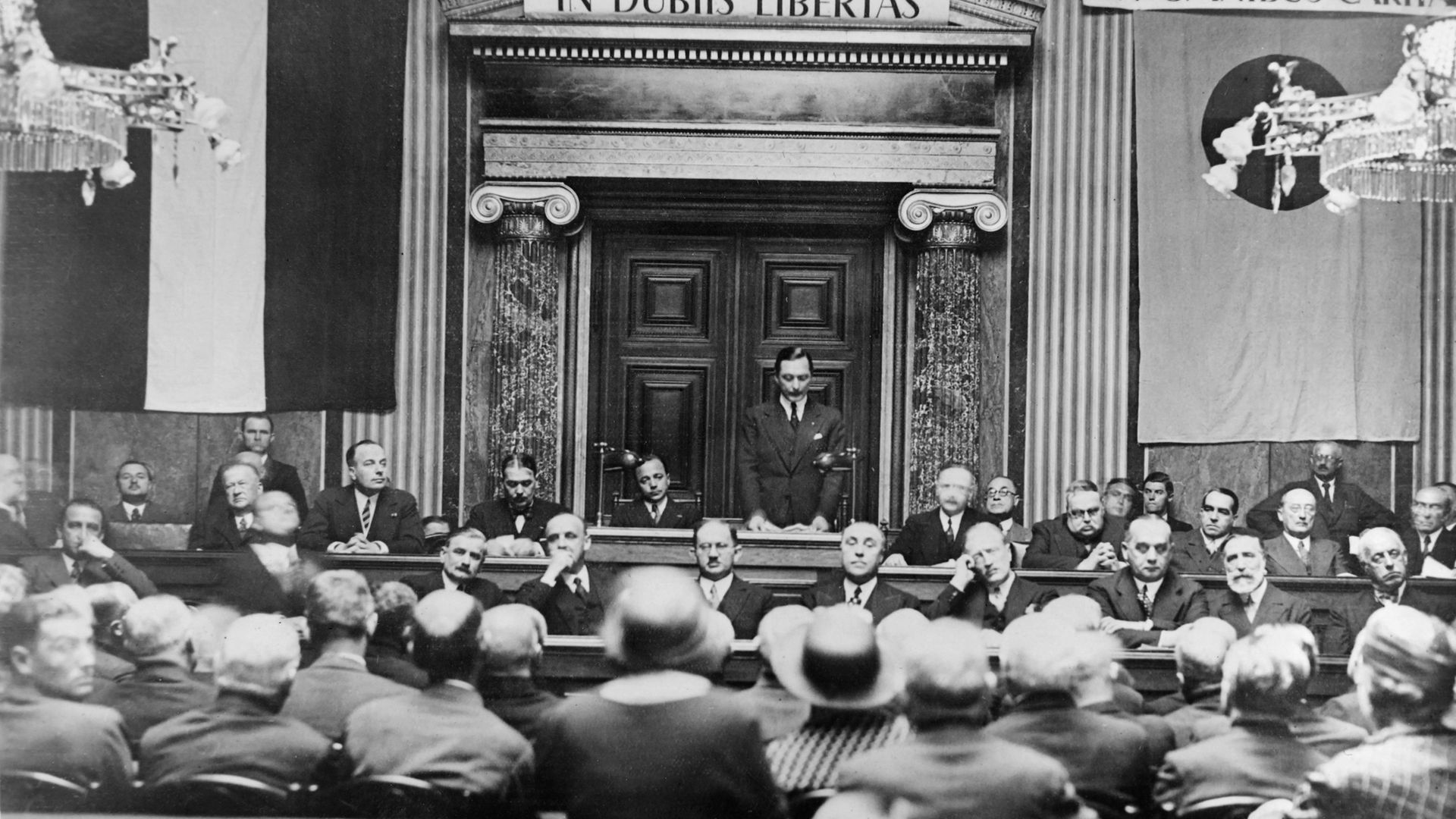
Richard von Coudenhove givjng his famous "Paneuropa" speech at the first Five Powers Conference (1946)
March, 1946: Indonesia gains its independence, becoming a client state and firm ally of Japan. Its president, the nationalistic Sukarno, calls for all of the East Indies to be united under Indonesian rule, triggering concern in the Portuguese government over the future of their colony of East Timor.
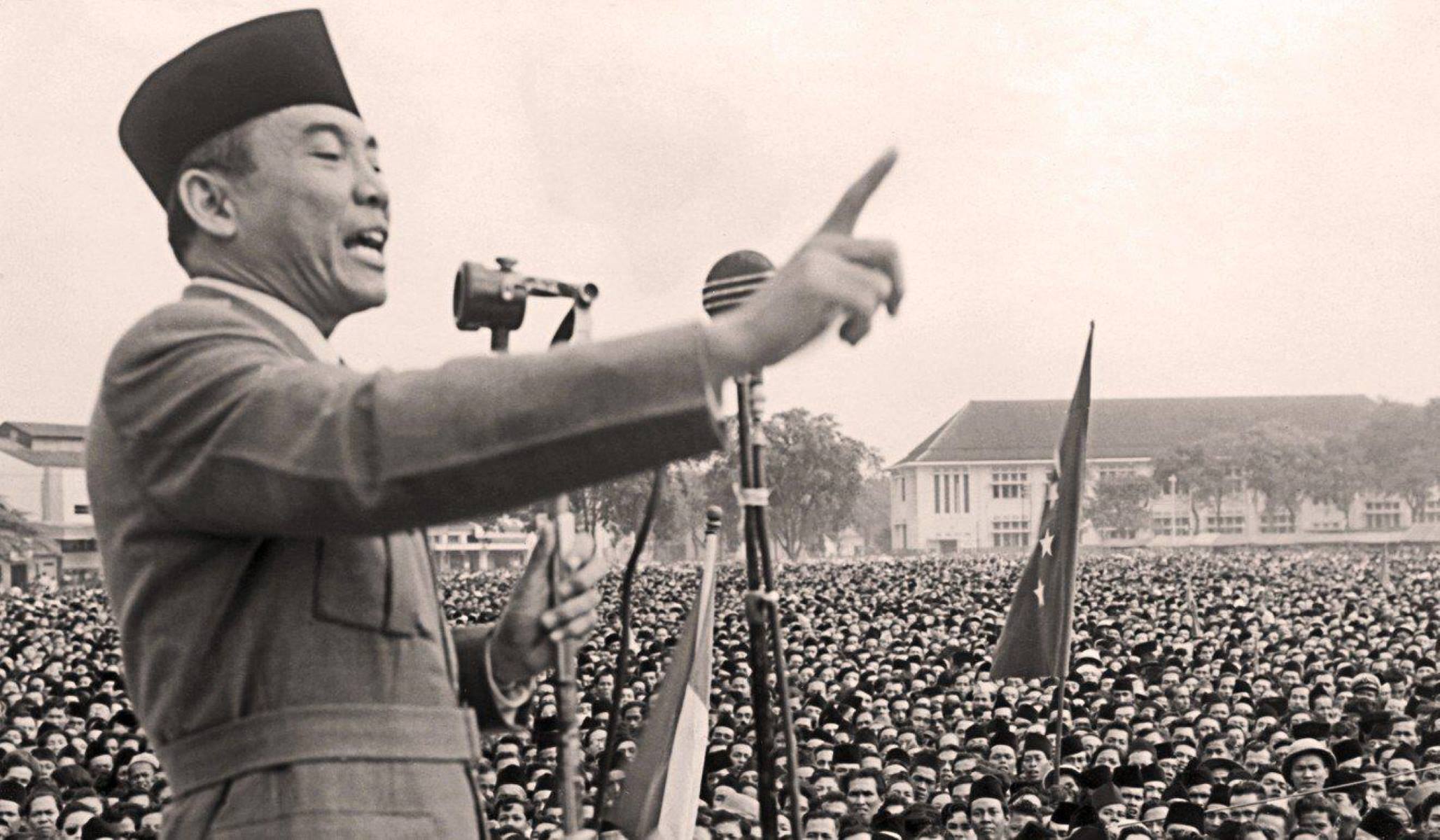
President Sukarno annnouncing Indonesia's independence.
1946 onwards: In accordance with the Dewey (and Morgenthau) plans, occupation authorities begin mass requisitioning of food from southern farms in order to control the distribution of food to Southern inhabitants and limit their food intake to subsistence levels. The policy is intended to reduce the chance of rebellion against the U.S. and to create a reliable method of control over the South. Despite these aims, several farmers engage in resistance against the occupation authorities, and are detained in a sprawling network of detention camps popping up throughout the South.
Growing guerilla violence, concentrated in the rural areas of the Deep South as well as the Appalachian Mountains, plagues U.S. efforts to administer the former Confederacy. Some rural areas have fallen under the complete control of insurgents, who are largely comprised of former soldiers, Freedom Party officials, and civilian militia who refuse to recognize the Confederate Instrument of Surrender.
While an additional 20,000 troops are sent to the south to help quell the rebellion, publicly the Dewey Administration downplays the insurgency, with Dewey calling the militants “wreckers” and “remnants of a bygone nation” that will be easily defeated.
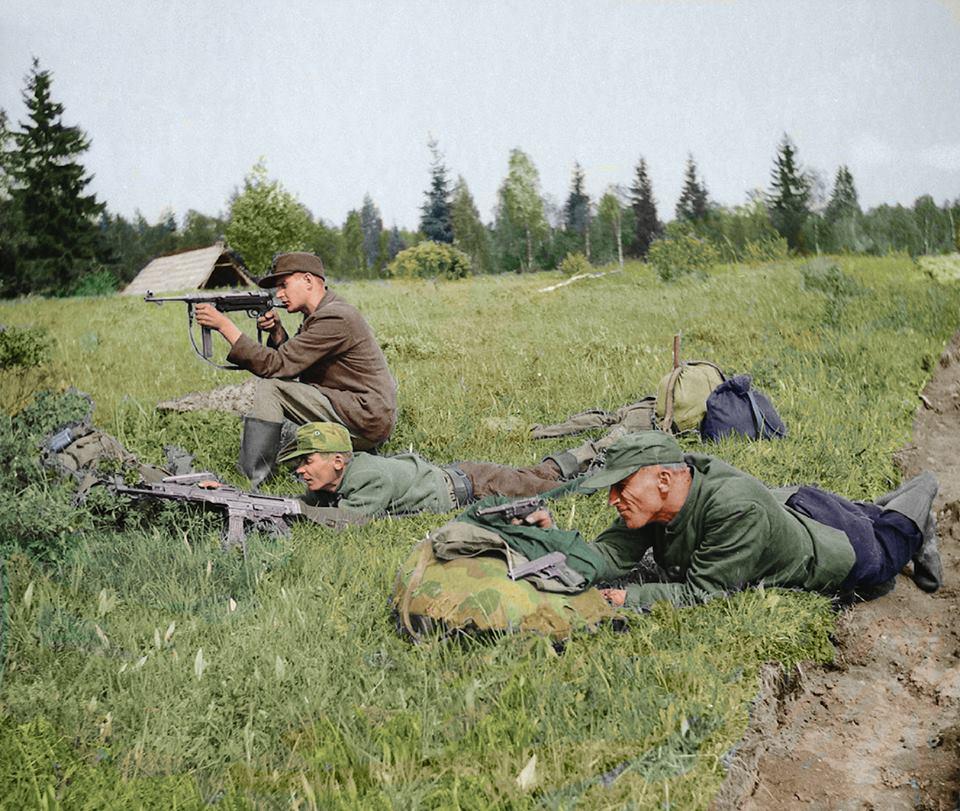
Confederate "Remnants" laying an ambush position against a US patrol
April, 1946: With some insistence from the Ottoman Empire, King Faisal II of Egypt formally renounces his sovereignty over Sudan, which becomes an independent nation. Ruled by the charismatic religious leader Abd al-Rahman al-Mahdi, the new Sudanese Mahdiyya is a firm and loyal supporter of the sultan in Constantinople [1]. However, the re-establishment of the Mahdist state is not popular among the Christian minorities in the country. Furthermore, Egyptian nationalists are incensed at the loss of Sudanese territory, and their faith in the monarchy reaches an all-time low.
April, 1946: Grand Prix racing competitions resume, with races in Europe, North America, and South America. The Munich and San Francisco Grand Prix are the first to be considered compliant with the “Formula One” rules.
May, 1946: Poland wins the 1946 Football World Cup held in Sweden.
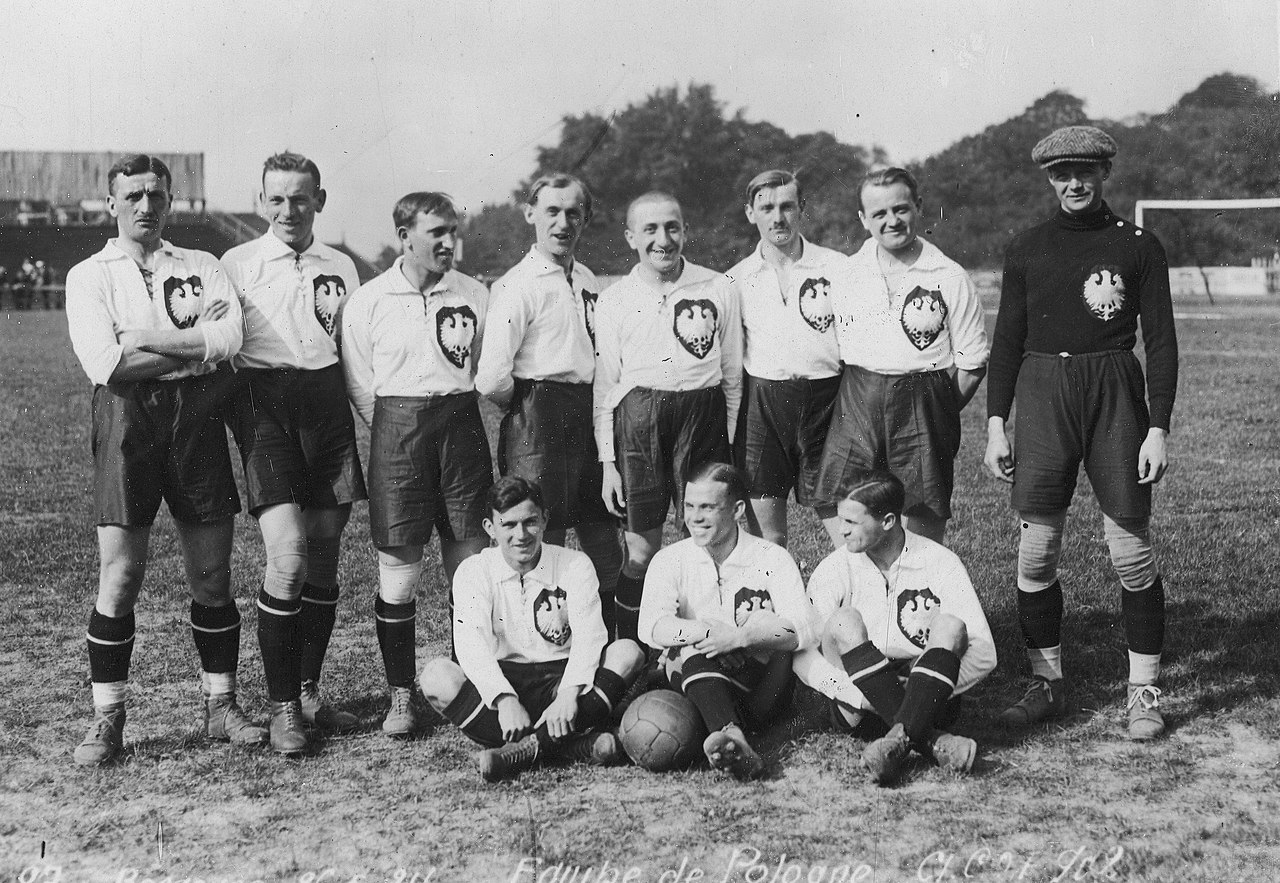
The 1946 Polish national football team
May, 1946: Henry Wallace, representing the Socialist Party of America at the International Working Union of Socialist Parties in Rome, delivers the “Century of the Common Man” address, outlining his vision of a world free from exploitation and want.
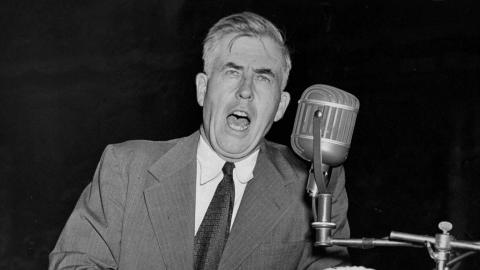

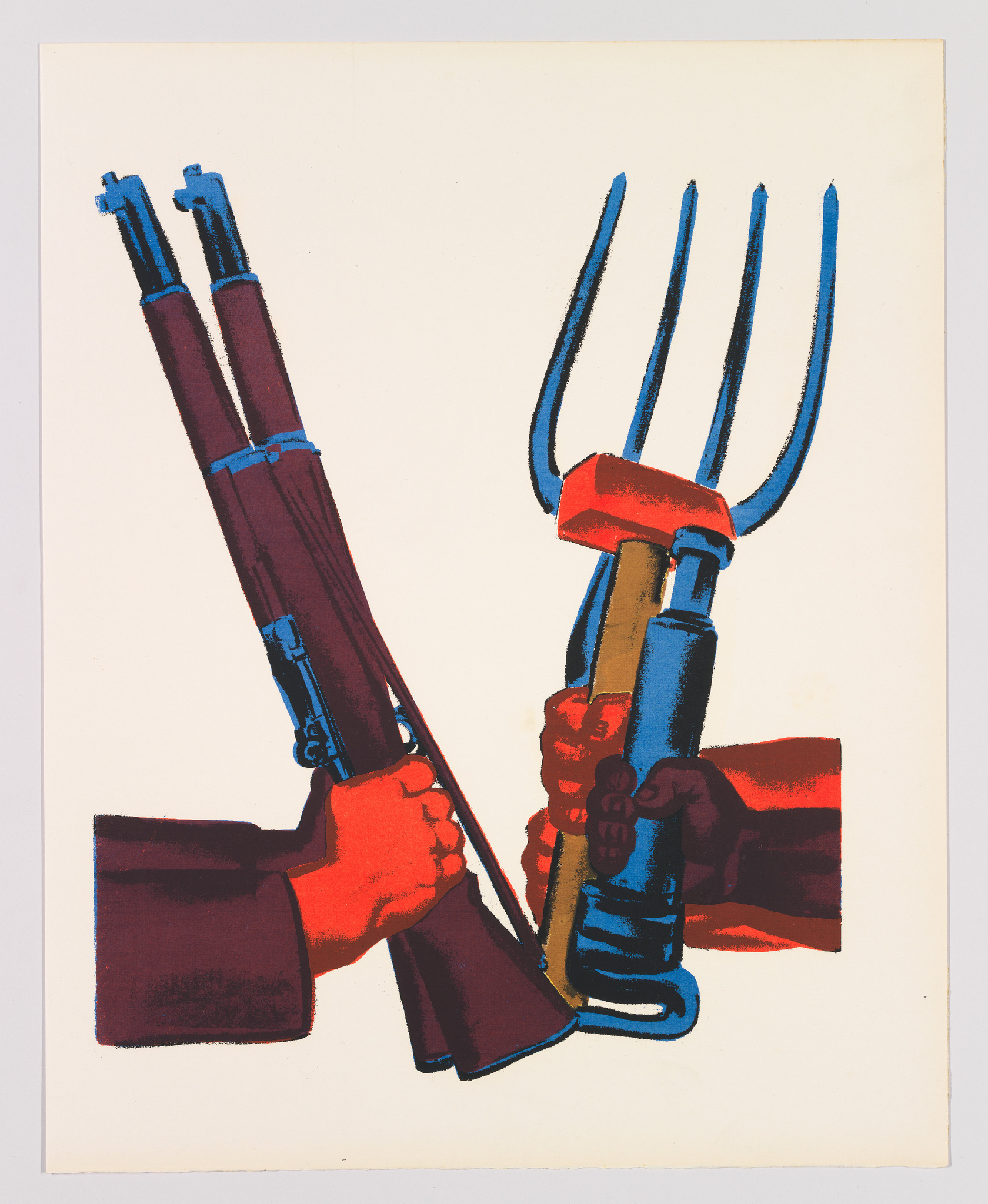
May, 1946: Simmering tensions between American and immigrant laborers reach a fever pitch in the summer of 1946. The economy had only started its recovery from the 1944 recession, and despite Dewey’s reconstruction programs much of the residents in the Great Lakes region still reside in refugee camps and makeshift shelters, with essential services and infrastructure still unavailable for the vast majority of people. Only a fraction of the industrial plants still open during the early 1940s have been rebuilt.
A scarcity of jobs means both native-born Americans and immigrants, who are mostly from Eastern Europe, compete for the same positions, with several factories preferring to employ the non-unionized immigrant labor force as workers.
On May 1st (May Day), a series of worker demonstrations in Youngstown, Ohio devolve into riots, with mobs attacking people of Eastern European and Jewish descent. Violence expands to cities across the Midwest, with Remembrance groups such as the Soldiers’ Circle joining in on the attacks.
As the weeks go on, rioting spreads to the West Coast, this time targeting Asian Americans (such as Chinese and Japanese Americans) as well as Mexican Americans. Both in the Midwest and West Coast, around 137 people are killed in what is later known as “Bloody May”. The true extent of these riots and pogroms will not be properly explored by historians until the 2000s.
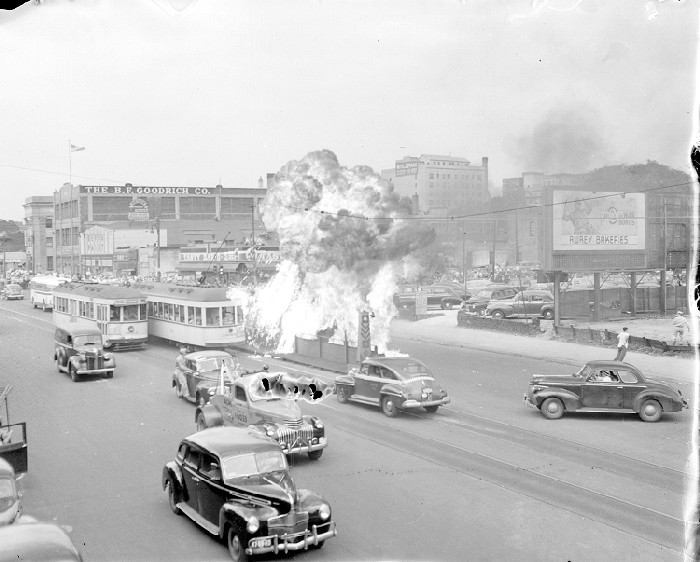
The "Bloody May" riots in Detroit
May, 1946: Germany achieves important concessions from Wang Jinmei’s northern KMT government, based in Shanghai. These include trading and economic rights as well as the ability to station soldiers in the port of Shanghai.
June, 1946: The film Rio releases in the United States. Set in the Brazilian capital of Rio de Janeiro during the Second Great War, the story follows a young American spy, Jackson Douglas, on a mission to deliver information about a British superweapon.
June, 1946: The United States formally purchases Greenland and Iceland from Denmark for $200 million. Both territories had been under U.S. occupation since 1944. While Germany has some reservations, it accedes to the purchases as long as the United States does not deploy a significant number of troops or naval equipment in Iceland.
July, 1946: Ever since the fall of the Confederacy, several of its client states in Central America have fallen into turmoil. In Nicaragua, a civil war reignites between President Anastosio Samoza Garcia’s National Guard and revolutionaries led by Augusto Sandino. Beginning in July, the U.S. Navy attacks parts of the Nicaraguan coast, and captures Puerto Samoza, allowing for the rebels to be supplied with artillery and barrels. At the Battle of Masaya, the rebels, with assistance from US air power, take control of the heights around the capital city of Managua. In a deal negotiated by the U.S., Samoza flees to Brazil, saving the capital from a siege and allowing Sandino to create a new government [2].

US planes drop bombs over Nicaraguan government positions
July, 1946: Chinese warlord Long Yun, with Japanese support, rises against the southern KMT government based in Canton (Guangdong), taking much of Yunnan and Guangxi provinces and declaring the “Yunnan Governate”. The rise in power of the Yunnan Government gives the Japanese great influence in Southern China, especially around the border regions of Japanese Indochina.
August, 1946: German singer Marlene Dietrich begins her North American tour, where she is greeted enthusiastically in several U.S. cities. However, she is received coolly in Quebec. During a show in the city of Trois Rivieres, the audience chants “Vive Francaise Libre!” and throws rotten apples and garbage at the stage. Dietrich and her entourage leave Quebec for their safety.

Marlene Dietrich on stage in Trois Reivieres, Quebec, right before audience members begin throwing garbage on stage.
August, 1946: The Economic Relief Administration consolidates several steel companies such as U.S. Steel and Bethlehem Steel into the National Steel Corporation. The steel industry was heavily impacted by Operation Blackbeard, with several manufacturing facilities in the Midwest damaged by the war. National Steel is given several government subsidies and loans, as well as industrial equipment confiscated from former Confederate plants in Birmingham. The Association of Steelworkers labor union is given one-fifth of the seats on the company’s board of directors.
August, 1946: Various European nations attend the Schonhausen Conference in Berlin to discuss continent-wide economic policy. The European Customs Union, a common market among member nations, is formed. In addition, European Monetary System is created, pegging the currencies of member states to the Reichsmark to ensure “financial stability”. Critics accuse these two bodies of furthering German hegemony over Europe.
Italy is also an attendee at the Schonhausen Conference, and while it does not join the customs or monetary union it becomes a "most-favored nation" of the trading bloc, with major concessions granted over tariffs and market access. Germany hopes that Austro-Hungarian and Italian tensions will subside if Italy becomes more integrated into the Mitteleuropa system. Italy, on the other hand, does not want to become economically isolated from Europe, but simultaneously wishes to maintain its self-reliance and economic independence.
August, 1946: In the Blida Massacre, Pied Noir soldiers kill over 200 Arab Algerians, resulting in a wave of demonstrations and retaliatory violence.
September, 1946: The American Handball League is founded in Des Moines, Iowa. Comprised of about twenty teams across the nation, the league will see massive growth over the coming decades.
September, 1946: The 1946 German General Elections result in a victory for the Free Conservative Party, led by Carl Goerdeler, and their coalition partner, the Centre Party, led by Franz von Papen. Although the Social Democratic Party (led by Otto Grotewohl) wins a plurality of the seats, they are short of a majority and are unable to form a government. Goerdeler continues his tenure as Chancellor, with von Papen reinstated as foreign minister.
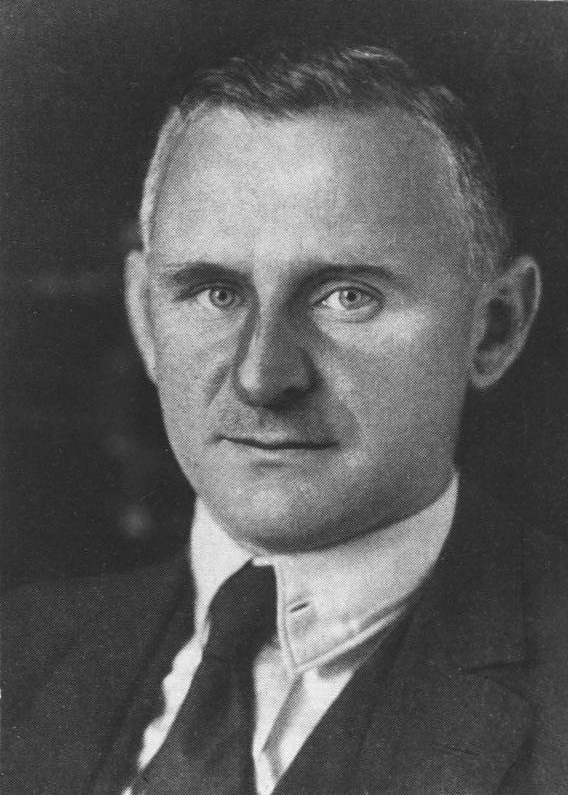
Carl Goerdeler, Chancellor of Germany
October, 1946: Bolshevik revolutionaries in Russia capture the cities of Perm and Yekaterinburg as the nation delves further into instability. In response to the alarming rise in power of the Bolsheviks, the German Empire begins to provide arms shipments to the Czarist army as well as generous loans. However, this assistance comes at a price, and Germany is set to achieve economic control over Russia's vast resources.
October, 1946: Secretary of State George Kennan embarks on a diplomatic tour of South America, with an emphasis on the nations of Chile, Argentina, and Brazil. While Kennan is well received in all nations, there is still some tension with Brazil due to American involvement in Nicaragua, as Brazil is wary of the spread of revolutionary sentiments in the Latin American region. Kennan promises that the United States will not be involved in the internal affairs of any nation in South or Central America [3].
October, 1946: The writer JRR Tolkein, currently residing in South Africa, publishes the epic fantasy novel The Fall of Gondolin. The novel is the first in a series of books describing the epic tale of the Silmaril Jewels, collectively known as The Silmarillion. The novel is met with mixed reception at the time of publishing, though it later goes on to become a literary classic. In Germany, the novel is interpreted as an elaborate metaphor for the fall of Britain in the Second Great War, and is therefore banned from being published in the country until the 1960s. However, the novel does enjoy popularity in other parts of Europe such as Austria-Hungary.

A 2020 edition of the novel The Fall of Gondolin.
November, 1946: Socialists gain control of the House and Senate in the 1946 midterm elections, Despite Dewey’s reconstruction and relief efforts, voters are dissatisfied with shortages of goods and a sluggish economic recovery after the 1944-45 recession. During the election campaign, Socialist politicians criticized the refusal of the Dewey administration to enact price controls on key products, blaming this on Dewey’s friendliness with Big Business. Republicans also expand their seats in the House and Senate.
Key politicians who won seats in this election include:
- Harold Stassen (Republican): elected U.S. Senator for Minnesota
- Joseph McCarthy (Socialist): elected U.S. Senator for Wisconsin
- Vito Marcantonio (Socialist): elected U.S. Senator for New York
- Lee Pressman (Socialist): elected U.S. Senator for New Jersey
- James P. Cannon (Socialist): elected Governor of Kansas
- Henry Wallace (Socialist): elected Governor of Iowa
- William Knowland (Democratic): elected U.S. Senator for California
Gauss Station, the first permanent Antarctic base
December, 1946: Japan delivers a secret “request” to Portugal for the colonies of Macau and East Timor to be placed in a joint administration with the Yunnan Governate and Indonesia respectively, as well as permission to station marines and navy ships in both territories. The request also mentions the possibility of a Japanese purchase of the territories if Portugal finds the terms unsuitable.
Japan also “requests” Australia for naval access in its ports along the Timor Sea and the Torres Strait, as well as for Australia to declare itself a neutral nation.
Both Australia and Portugal view the requests as a thinly veiled ultimatum, and appeal to the United States and Germany for assistance.
[1] Ironically, the Mahdists were initially formed during a revolt against the Ottomans in the 19th century.
[2] The United States is not acting out of pure altruism. It has some interests in Nicaragua that will be explored in later updates.
[3] Whether this promise is kept remains to be seen.
Last edited:
A Kingdom of France with a Spanish-born king? I didn't see that coming. It would make sense. The Orleanists have lost all credibility, the Bonapartists couldn't be trusted and Republicanism was declared a failure after the First Great War. Would the flag go back to the white flag?
Share: